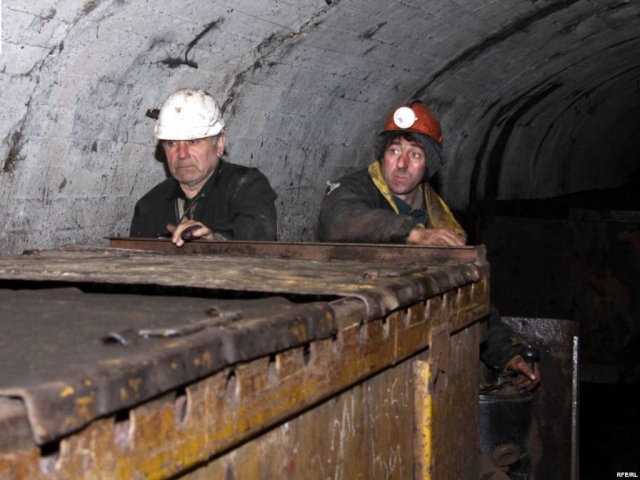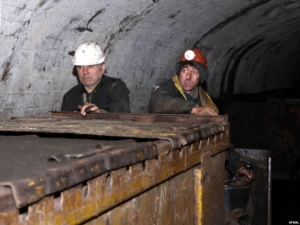Georgian Miners Dig In as Protest Enters Second Week
Georgian coal miners demanding better pay and improved working conditions appear to be digging in.
Over 1,000 miners from the Dzidziguri and Mendeli coal mines near the western Georgian city Tkibuli have refused to work, saying their wages have not increased despite the rising cost of living and precipitous devaluation of the national currency, the Georgian Lari.
The Lari has lost nearly half of its value against the Dollar since late 2014, which has caused a severe spike in inflation and cut the value of the coal miners’ salaries to an average of $225 per month.
The exchange rate of the Lari against the greenback opened Monday at 2.48 Lari = $1.00, down from 1.74 Lari = $1.00 on 1 March 2014.
The protests grew violent on 24 February when hundreds of miners stormed managing company Saqnakhshiri’s headquarters in Tkibuli.
“None of our petitions or statements has brought results. The administration simply laughed at us and they aren’t going to respond to any of our demands,” said Dmitry Khuskivadze, one of the protester told the Western media.
Saqnakhshiri’s parent company, Tbilisi-based Georgian Industrial Group (GIG) has thus far refused to meet the demands of the protesters, only conceding that they will review the possibility of revising the miners’ salaries by mid-April.
Further infuriating the miners was a government decision to revoke the so-called ‘highlander status’ that the mines’ 14 surrounding villages had previously enjoyed.
The new law suspending the Imereti region’s mountainous areas of their privileged status went into effect on 1 January. The result forced the Tkibuli miners to pay an income tax that exceeded 20 per cent.
Georgia’s Finance Minister Nodar Khaduri announced on 25 February that the government would meet the miners’ demands to cancel the law on highland status.
“We’ve prepared an amendment to the original bill that suspended tax breaks for those individuals working and living in mountainous regions. Specifically, this deals with the demands of the miners, who will keep the benefits they received before 1 January. We are already consulting with members of parliament on how to revise the law. The bill will be brought to a vote sometime in the near future,” Khaduri said at a press conference on 25 February.
Despite the federal government’s attempt to calm the situation, the protestors again stormed and briefly occupied Saqnakhshiri’s administrative offices on 26 February. They continue to demand an immediate 40 per cent increase in their salaries and direct government action
Both the government and GIG have flatly rejected the miners’ demands, saying both are unrealistic and financially unattainable in the short term.
GIG’s chief financial officer Zurab Gelenidze has openly disparaged the protestors and has demanded that they need to return to work or face consequence if the company’s contractual obligations are not met.
“We’re only talking about…a couple hundred people who are on strike. The other 1,300 that we employ need to get back to work immediately. Regarding an increase in salaries, we will review the matter in two months and do everything to optimize the wage system and provide some improvement.”
The protestors have frequently cited a 2011 agreement, endorsed by Georgia’s Labor Union Chair Irakli Petriashvili, which obligated the company to increase their salaries based on the current inflation rate.
Kakha Kozhoridze, an advisor to Georgian President Giorgi Margvelashvili and an acting emissary between the miners and GIG’s management, said Sunday the company rejects the 2011 agreement as they claim the document is not legally binding because the signatures of GIG’s representatives were forged.
Kozhoridze has rebuffed GIG saying the company’s claim that the signatures are forgeries is ridiculous, as the management never questioned their authenticity in the five years since being signed.
He has consistently demanded that the company meet the protestors’ requests.
Local NGOs and human rights observers have also lined-up in support of the miners, saying the company’s disingenuous overtures to the protestors are meant to table the issue as they will not be subject to legally binding agreements.
“The problems that workers in Georgia experience today arose from the lack of an effective government labor policy. No adequate standards to protect workers’ rights were ever created. Most importantly, there are no mechanisms for monitoring their implementation,” Human Rights Education and Monitoring Centre’s legal counsel Lina Gvinianidze told the Western media.
With support for the miners’ plight spilling over into a weekend protest by Tbilisi students, the current government finds itself in a position where it may need to act swiftly, with concrete legal solutions, in order to avoid further labor unrest as the economy continues to falter.
By Nicholas Waller
Photo: RFE/RL












